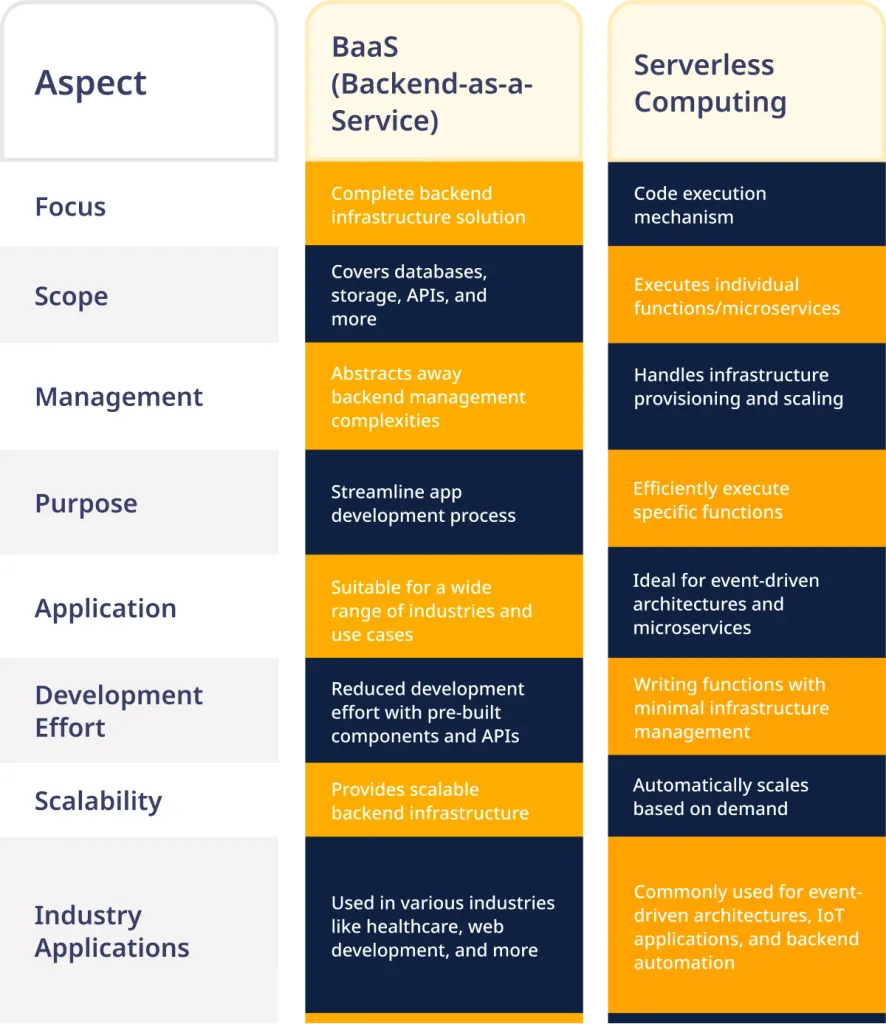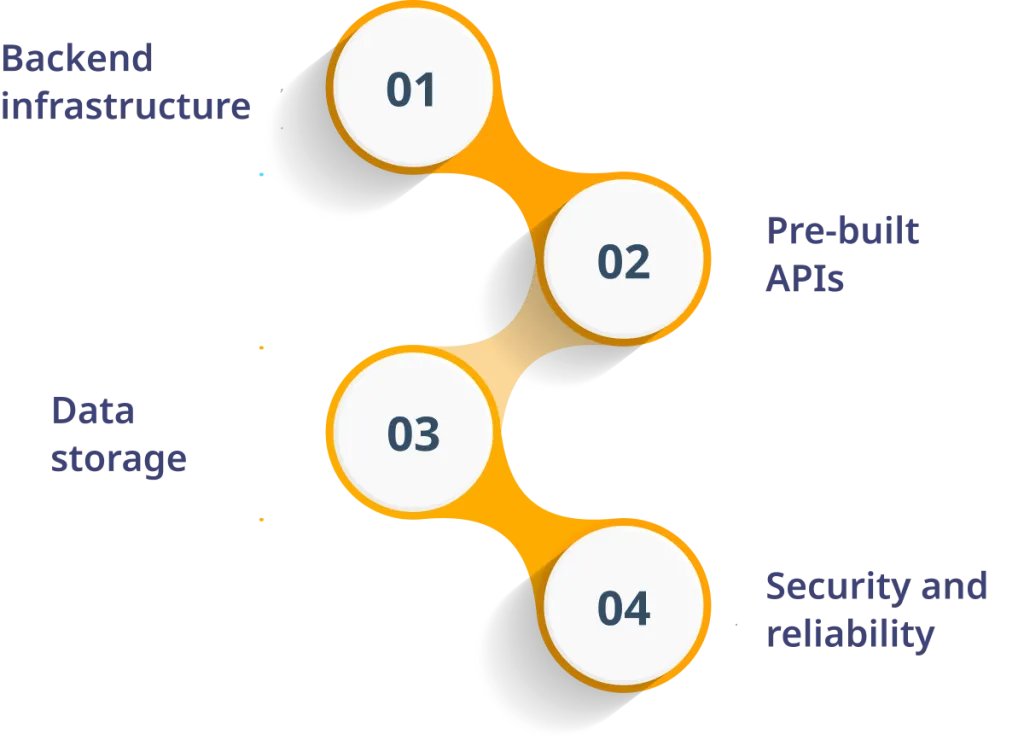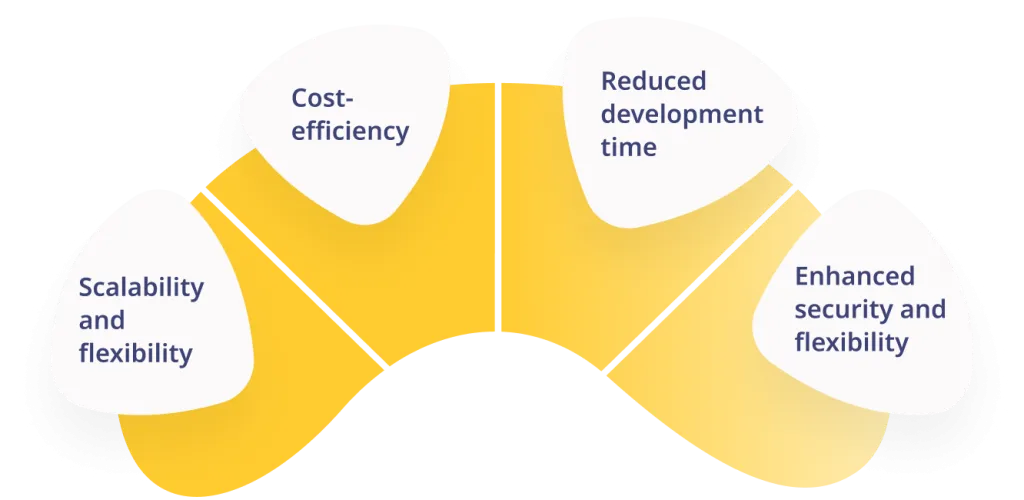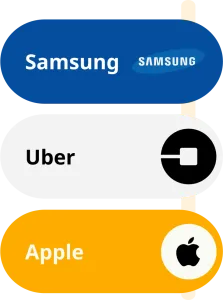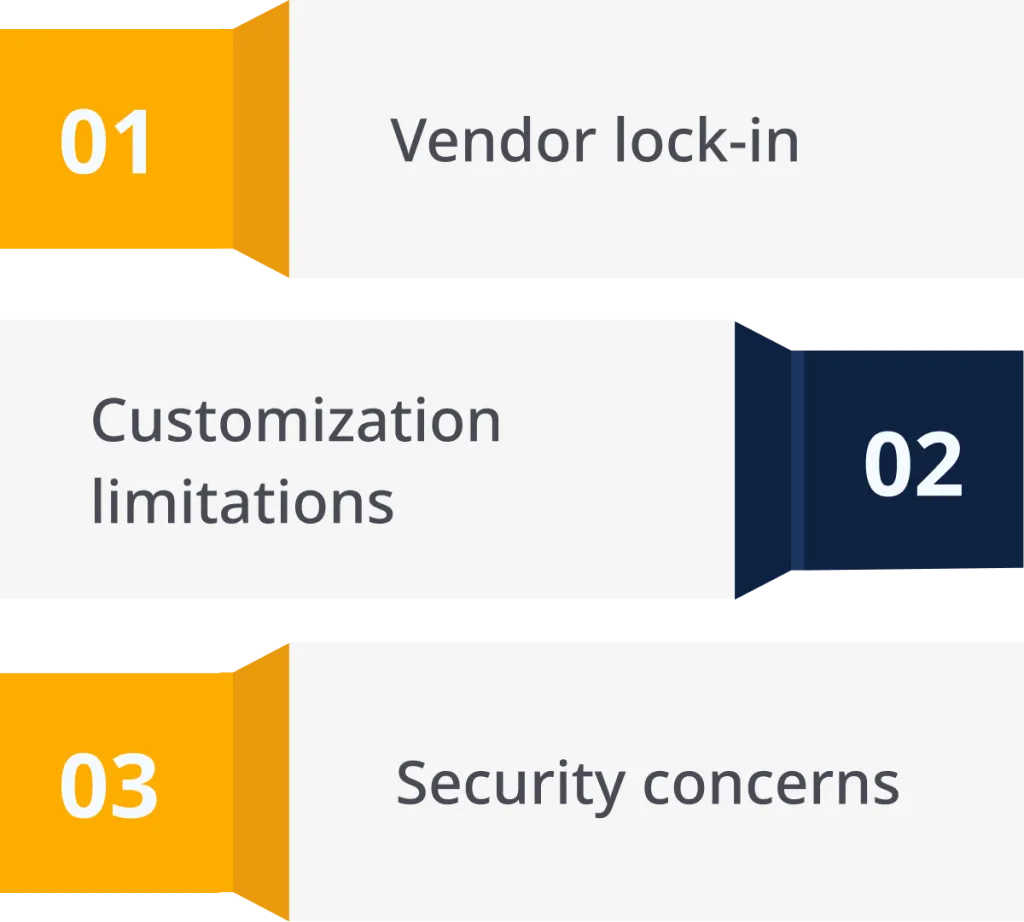Are you ready to conquer the app market and skyrocket your success? Imagine having the power to focus on creating extraordinary user experiences while leaving the backend complexities to experts. Discover the world of Cloud Backend-as-a-Service (BaaS), the game-changer for app market domination.
In this fast-paced digital era, businesses need agile solutions to thrive. Whether you’re in cloud application development, healthcare, or any other industry, leveraging BaaS can unlock unprecedented opportunities.
Join us on a journey where we unravel the secrets of Cloud Backend as a Service success and discover how it revolutionizes web application development. Get ready to seize the competitive edge and make your mark in the app market.
What Is BaaS?
BaaS, short for Backend-as-a-Service, is a revolutionary cloud computing model transforming how businesses develop and maintain their applications. BaaS provides cloud application developers with a ready-to-use backend infrastructure at its core, freeing them from the complexities of server management, database setup, and other backend operations.
In app development, the backend infrastructure is crucial in powering mobile application functionality and seamless user experiences. However, developing and maintaining this infrastructure can be time-consuming, resource-intensive, and require expertise in various technologies. This is where BaaS steps-in to simplify the process.
With BaaS, cloud application developers can focus on creating exceptional user interfaces and engaging features without worrying about the intricate details of backend operations.
BaaS comes with pre-built APIs and tools that streamline the development process, providing user authentication, push notifications, data storage, and more functionalities. These APIs serve as the building blocks for developers to integrate powerful features into their applications easily.
Is BaaS Similar To Serverless Computing?
While there are similarities between BaaS (Backend-as-a-Service) and serverless computing, they are not identical concepts. BaaS and serverless computing serve distinct purposes within cloud development and app market domination.
Serverless Computing
Serverless computing focuses on executing individual functions or microservices without managing servers. It allows developers to write code as functions triggered by specific events or API calls. Serverless platforms, such as AWS Lambda or Azure Functions, handle the underlying infrastructure’s scaling, provisioning, and management.
BaaS
On the other hand, BaaS addresses the broader scope of the backend infrastructure. It offers a complete set of backend services, including databases, storage, APIs, and more, to streamline the development process. BaaS providers, such as Firebase or Parse, abstract away the complexities of backend management, allowing developers to leverage pre-built components and APIs for rapid app development.
While serverless computing focuses on code execution, BaaS provides a comprehensive solution for backend operations.
BaaS platforms cater to a broader range of requirements, making them suitable for cloud application developers across various industries, including healthcare, where cloud computing plays a vital role in data storage, analysis, and interoperability.
In web application development, BaaS offers the necessary infrastructure to power backend operations, while serverless computing provides a mechanism for executing specific functions within that infrastructure. By combining both approaches, businesses can create scalable, secure, and efficient applications that dominate the app market.
Overall, while BaaS and serverless computing share similarities in terms of their cloud-based nature and their ability to simplify development, they serve different purposes. BaaS offers a complete backend infrastructure solution, enabling app developers to focus on their core competencies, achieve cloud backend as a service success, and dominate the app market.
Let ValueCoders Help You Leverage Cloud Backend as a Service!
How Does Backend-as-a-Service (BaaS) Work?
Backend-as-a-Service (BaaS) offers businesses a convenient solution for managing their daily operations. It simplifies overseeing and accelerating backend development while effectively managing cloud infrastructure.
BaaS operates through three distinct layers:
- Foundation: The foundation layer consists of servers responsible for executing programs and ensuring data backups. These servers form the backbone of the BaaS infrastructure, providing the necessary resources for seamless operation.
- Applications: BaaS products handle various requests in this layer, such as user authentication or login functionalities. The applications built on the BaaS platform leverage these services to enhance user experiences and streamline backend processes.
- Connection: At the connection layer, the application servers gain access to the internet. This connectivity enables seamless interaction between the BaaS platform and external services, APIs, or third-party integrations, ensuring smooth communication and data exchange.
BaaS enables businesses to focus on core competencies by functioning across these layers while relying on a robust backend infrastructure.
It eliminates the need for businesses to set up and manage their servers, databases, and other backend components. Instead, BaaS providers handle these complexities, allowing businesses to leverage pre-built features, APIs, and tools to accelerate development and enhance overall efficiency.
Also Read: Cloud Computing Vs. Blockchain Technology: Which Is Right For Your Business?
BaaS key components:
Backend-as-a-Service (BaaS) is a cloud computing model that simplifies the development and management of the backend infrastructure for applications. It allows businesses, including cloud application developers across industries like healthcare, to offload backend responsibilities and focus on creating exceptional user experiences.
BaaS consists of several vital components that work harmoniously to streamline app development. These components include:
- Backend infrastructure: BaaS providers offer a cloud-based infrastructure that includes servers, databases, and storage systems. This infrastructure eliminates the need for businesses to set up and manage their backend infrastructure, saving time and resources.
- Pre-built APIs: BaaS platforms provide a set of pre-built APIs that developers can leverage to integrate essential functionalities into their applications. These APIs cover many features, such as user authentication, social media integration, push notifications, and data storage. Businesses can quickly accelerate development and deliver feature-rich applications by utilizing these APIs.
- Data storage: BaaS solutions include database management capabilities, enabling businesses to store and retrieve data efficiently. This ensures seamless data handling and scalability as the application grows and handles increasing user demands.
- Security and reliability: BaaS platforms prioritize security and reliability. They implement robust security measures such as user authentication, data encryption, and compliance with industry regulations. Additionally, BaaS providers offer reliable infrastructure with built-in redundancy and disaster recovery mechanisms, minimizing the risk of data loss or downtime.
Benefits of using BaaS for businesses:
Significant benefits of using BaaS for businesses include the following:
- Scalability and flexibility: BaaS offers businesses a scalable infrastructure to handle increasing app usage and traffic spikes effortlessly. This scalability allows businesses to cater to a growing user base without compromising performance, ensuring app market domination.
- Cost-efficiency: By adopting BaaS, businesses can significantly reduce upfront costs associated with creating and maintaining a backend infrastructure. BaaS providers offer flexible pricing models, allowing businesses to pay only for the required resources and services. This cost-efficiency contributes to the overall success of businesses in the app market.
- Reduced development time: BaaS platforms offer pre-built components and APIs that eliminate the need to build everything from scratch. This accelerates the development process, allowing businesses to launch their applications quickly and gain a competitive edge. With reduced development time, businesses can respond faster to market demands and user needs.
- Enhanced security and reliability: BaaS providers prioritize the safety and reliability of the backend infrastructure. By leveraging BaaS, businesses can benefit from advanced security measures, including data encryption, user authentication, and compliance with industry standards. Additionally, BaaS platforms offer reliable infrastructure with built-in redundancy and disaster recovery mechanisms, ensuring data integrity and minimizing disruptions.
Click Here to Consult with ValueCoders' Cloud Experts.
Why Does Your Business Need a Backend-as-a-Service?
In today’s fast-paced and highly competitive digital landscape, businesses need every advantage to succeed in the app market and achieve cloud backend as a service success. This is where Backend-as-a-Service (BaaS) becomes indispensable.
By adopting BaaS, businesses can unlock various benefits directly contributing to their success.
- Firstly, BaaS enables businesses in industries like healthcare to focus on their core competencies by offloading backend complexities. This means more time and resources can be allocated towards creating exceptional user experiences and innovative features that set them apart from competitors.
- Secondly, BaaS accelerates the development process by providing pre-built backend components and APIs. This significantly reduces development time, allowing businesses to launch their applications faster and gain an edge in the market.
- Furthermore, BaaS offers scalability, flexibility, and cost-efficiency. With a scalable infrastructure, businesses can seamlessly handle increasing user demands without compromising performance. The flexible pricing models of BaaS providers allow businesses to pay only for the resources and services they require, resulting in significant cost savings.
- Lastly, BaaS enhances security and reliability. BaaS providers implement robust security measures, ensuring data privacy, encryption, and compliance with industry regulations. Additionally, they offer reliable infrastructure with built-in redundancy and disaster recovery mechanisms, minimizing the risk of data loss or downtime.
Businesses need Backend-as-a-Service to dominate the app market by leveraging its benefits. With BaaS, businesses can thrive in the competitive landscape of web application development and drive cloud backend as a service success.
Real-Life Examples Of Enterprises Utilizing BaaS
-
Samsung
Samsung, a global leader in consumer electronics, has embraced Backend-as-a-Service (BaaS) to power its mobile applications. Focusing on delivering best-in-class user experiences, Samsung leverages BaaS platforms to offload backend complexities and streamline its development process.
By leveraging BaaS, Samsung can concentrate on creating innovative features and user interfaces, ensuring cloud backend as a service success in the highly competitive app market. This allows Samsung to dominate the app market by delivering high-quality mobile applications to millions of users worldwide.
-
Uber
The renowned ride-sharing platform, Uber, relies on BaaS to fuel its operations. BaaS is pivotal in managing critical backend functionalities, including user authentication, real-time tracking, and push notifications.
By leveraging BaaS platforms, Uber can optimize its development efforts, reduce time-to-market, and enhance scalability. This enables Uber to meet the growing demands of its user base and stay ahead of the competition in the app market. The use of BaaS contributes to Uber’s success by providing a reliable and efficient backend infrastructure for its global transportation platform.
-
Apple
Apple, a leading technology company, utilizes BaaS to power its ecosystem of applications and services. BaaS enables Apple to streamline backend operations for its various services, including iCloud, Apple Music, and the App Store.
By leveraging BaaS, Apple can focus on delivering seamless user experiences and enhancing the security and reliability of its services. BaaS allows Apple to dominate the app market by providing developers with easy access to robust backend resources and functionalities, enabling them to create innovative and feature-rich applications for millions of Apple device users.
These real-life examples demonstrate how enterprises like Samsung, Uber, and Apple leverage BaaS to achieve cloud backend as a service success and dominate the app market. By embracing BaaS, these companies can accelerate development, enhance scalability, improve user experiences, and stay at the forefront of innovation in web application development.
Business Constraints With Backend-as-a-Service
While Backend-as-a-Service (BaaS) offers numerous benefits, significant constraints need to be considered:
- Vendor lock-in
One of the potential constraints of adopting BaaS is the risk of vendor lock-in. When businesses rely heavily on a specific BaaS provider, migrating to a different provider can be challenging.
This is primarily due to platform-specific APIs and infrastructure dependencies. It’s crucial for businesses to carefully evaluate the long-term implications and consider strategies to mitigate vendor lock-in risks.
- Customization limitations
BaaS platforms provide pre-built components and APIs that simplify backend development. However, this convenience may come with certain limitations in terms of customization and control over the backend infrastructure.
Businesses with specific and unique requirements may find it challenging to achieve a high level of customization within the constraints of the BaaS platform.
- Security concerns
Entrusting sensitive data to a third-party BaaS provider requires businesses to assess the security measures implemented by the provider thoroughly. While BaaS providers prioritize security, businesses must ensure that the chosen provider meets their specific security requirements and complies with relevant industry standards and regulations.
Proper encryption, data privacy, and access control mechanisms should be thoroughly evaluated to mitigate security risks.
To overcome these constraints, businesses should carefully evaluate their needs and conduct due diligence when selecting a BaaS provider. Understanding the trade-offs and limitations of the chosen BaaS platform is crucial for making informed decisions that balance the benefits of BaaS with the business’s unique requirements.
By addressing these constraints, businesses can effectively leverage BaaS to achieve cloud backend service success and thrive in the app market.
Reach out to ValueCoders for Cloud Backend as a Service Solutions.
Let The Cloud Consultants at ValueCoders Help You Out
Navigating the complexities of BaaS and harnessing its full potential for cloud backend as a service success can be daunting. This is where the expert cloud consultants at ValueCoders come into play. With their deep expertise in cloud development services and web application development, we can provide invaluable guidance and support to businesses aiming to dominate the app market.
Our consultants understand the unique challenges of cloud application developers and businesses’ in various industries, like healthcare and beyond. They possess extensive knowledge of cloud computing in healthcare and can tailor BaaS solutions to meet the healthcare sector’s specific requirements and compliance standards.
By collaborating with ValueCoders, businesses can leverage the experience and insights of their cloud consultants to devise robust strategies for cloud backend as a service success.
Whether selecting the right BaaS platform, addressing security concerns, or optimizing performance, ValueCoders’ consultants provide end-to-end assistance and ensure businesses achieve their app market domination goals.
ValueCoders’ team of cloud experts stays updated with the latest BaaS advancements and emerging web application development trends. They combine their technical proficiency with a deep understanding of business needs to deliver tailored BaaS solutions that drive success.
Don’t let the complexities of BaaS hold you back. Partner with the cloud consultants at ValueCoders and unlock the true potential of Backend-as-a-Service for your business’s app market domination and cloud backend as a service success.


